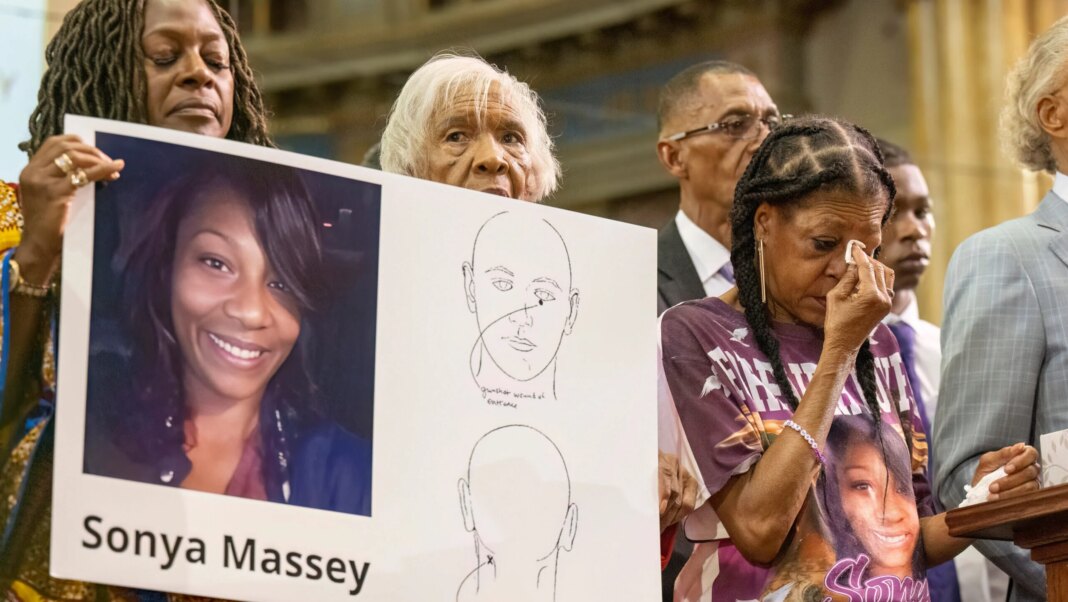Illinois Sheriff’s Deputy Convicted in Fatal Shooting of Sonya Massey
On a significant Wednesday in Illinois, a jury convicted Sean Grayson, a sheriff’s deputy, of second-degree murder in the tragic shooting death of 36-year-old Sonya Massey. This charge, while serious, is notably lesser than first-degree murder, which could have resulted in a sentence of 45 years to life. Grayson’s actions, which led to Massey’s untimely death, have reignited discussions about police conduct, particularly concerning vulnerable individuals in distress.
The Incident That Sparked National Outcry
On July 6, 2024, Massey, who had a history of mental health issues, called 911 reporting a suspected prowler at her home in Springfield, Illinois. Her call for help turned into a nightmare when Grayson and another deputy, Dawson Farley, responded to the scene. Within moments of entering her home, a confrontation ensued that would result in Massey’s shooting. Grayson fired his weapon after allegedly interpreting Massey’s handling of a pot of hot water as a threat.
Grayson’s Defense and the Jury’s Verdict
During the trial, Grayson claimed he believed Massey intended to use the hot water against him, which justified his use of lethal force. However, the jury did not fully embrace this narrative, opting for a second-degree murder conviction instead. This decision sparked outrage among supporters of Massey, who argued that the severity of her death warranted a first-degree conviction.
“I can’t believe this is justice. She called for help and was murdered in her own home,” expressed Teresa Haley, a prominent civil rights activist. This sentiment reflects a broader frustration with the legal system’s handling of police violence against marginalized communities.
Key Evidence and Testimonies
The prosecution leaned heavily on body camera footage from Deputy Farley, which captured Massey begging, “Don’t hurt me” and repeatedly invoking divine protection: “Please God.” This distressing video highlighted the context of the interaction and served as a stark contrast to Grayson’s assertion of fear. Farley testified that Massey posed no threat during the encounter and revealed that initial reporting described the atmosphere as relatively non-threatening.
Despite these revelations, the jury ultimately chose to consider the context of the confrontation, leading to the lesser conviction. Legal experts noted that the second-degree charge allowed for consideration of “serious provocation,” which Grayson’s defense leaned on heavily.
Community Response and Legal Changes
Massey’s death prompted immediate and significant reactions, not only from her supporters but also from state lawmakers. The incident led to a U.S. Justice Department inquiry and alterations in Illinois law aimed at enhancing transparency in the background checks of law enforcement candidates. These changes are intended to help prevent such tragedies in the future, highlighting a growing demand for accountability within law enforcement agencies.
Aftermath and Future Implications
The repercussions of the trial extended beyond the verdict itself. The sheriff responsible for hiring Grayson was forced into early retirement, reflecting the serious nature of the case and its impact on local law enforcement credibility. Additionally, the community’s outcry and Massey’s family’s subsequent settlement of $10 million against the county have underscored the financial and moral dimensions of addressing police-related violence.
Looking Ahead
Grayson, now facing sentencing, could potentially receive up to 20 years in prison, though probation is also a possibility. The outcome of this case will likely influence future law enforcement interactions with individuals experiencing mental health crises, as well as shape ongoing discussions about policing practices.
In the wake of Sonya Massey’s tragic death, her supporters continue to advocate for justice, pushing for systemic changes that ensure safety and respect, particularly for the most vulnerable members of society. The conversation surrounding this case is far from over, and its implications resonate deeply across Illinois and beyond.



